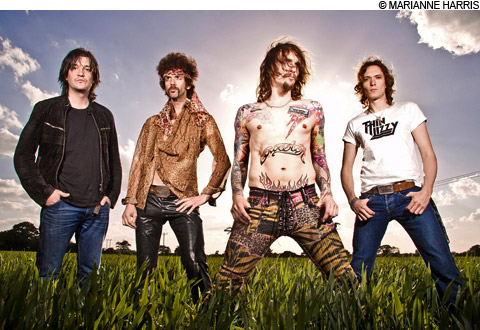
LAUNCHING A MILLION FALSETTOS The Darkness’s 2003 debut single, “I Believe in a Thing Called Love,” elicited strong opinions. |
I don't remember where I was the first time I heard "I Believe in a Thing Called Love," but I do know that I hated it. Off the Darkness's 2003 debut record Permission To Land, the song was everywhere for the following year or so. I was a discontented high schooler smitten with punk rock, so whenever my friend Kristen randomly broke out in Justin Hawkins's falsetto, I went into a silent, frothing rage. Kristen wasn't a bad singer, but the song signaled every adjective I found deplorable in music: chintzy, saccharine, hollow, derivative, ridiculous. The second coming of glam and hair metal seemed to be happening, and no one was doing a thing to stop it.The Darkness were certainly on a roll in the early '00s. Launching out of England, the band had a solid hand for hooks and gleefully played up hard rock and cock-rock tropes, blurring lines of sincerity and irony. Permission conquered the UK charts like it was no big deal. Guitarist/singer Hawkins — a knowing pastiche of Freddie Mercury flamboyance — landed on the cover of the February 2004 issue of Spin as part of a "Next Big Things" feature, and "Love" did gangbuster business Stateside. But after the initial hype faded, the Darkness receded from the cultural spotlight, even as follow-up record One Way Ticket to Hell . . . and Back arrived in 2005. Then, a year later, Hawkins announced that he was quitting the band to go into rehab, revealing that he had blown £150,000 on drugs in three years. That closed the book on the Darkness. Despite the group's knowing winks, their swift implosion indicated that maybe they were less self-aware than they seemed.
Last March, the group announced a reunion, and the news was met with the requisite buzz of excitement. In a recent conference call with US journalists, Hawkins didn't come off as the model of larger-than-life excess that his image in the Darkness had indicated for years. Much of what he said reflected a modesty that belied his image: he now lives "an ascetic life" in a small place near the sea, his parents, girlfriend, and animals. He feels that his band are like "the underdogs again," and recalled once cracking a joke to their accountant about making "a brilliant first album," "an okay second album," and then breaking up to do "an amazing reunion." He's two-for-two so far.
I asked him about the frequent comparisons to AC/DC and Queen, and what element — if any — made the Darkness stand apart. "I'm actually really good at spotting [plagiarism] and so we've always tried to avoid that. . . . We try to keep everything fresh. But, I mean, when it comes to actual idiosyncratic things that nobody else does, I don't know." There was something genuine and affecting about Hawkins acknowledging their role as entertainers versus innovators.
Hawkins's attitude has helped me listen to "I Believe in a Thing Called Love" differently. Perhaps it was created by a Darkness whose self-indulgence is of a piece with their nostalgia and yearning for a good time, whose sentimentality is just part of their easy charm as they slip in an in-joke here and there. I'm still not sure that viewing the band as a tongue-in-cheek, self-aware entity reflects reality, but it will do for now. ^
THE DARKNESS + FOXY SHAZAM | Paradise Rock Club, 967 Comm Ave, Boston | February 3 @ 8 pm | 18+ | $25 | 617.562.8800 or thedise.com